外研版(2019)必修一Unit 5 Into the Wild Using language课件(46张PPT)
文档属性
| 名称 | 外研版(2019)必修一Unit 5 Into the Wild Using language课件(46张PPT) |

|
|
| 格式 | zip | ||
| 文件大小 | 6.0MB | ||
| 资源类型 | 教案 | ||
| 版本资源 | 外研版(2019) | ||
| 科目 | 英语 | ||
| 更新时间 | 2022-11-07 00:00:00 | ||
图片预览

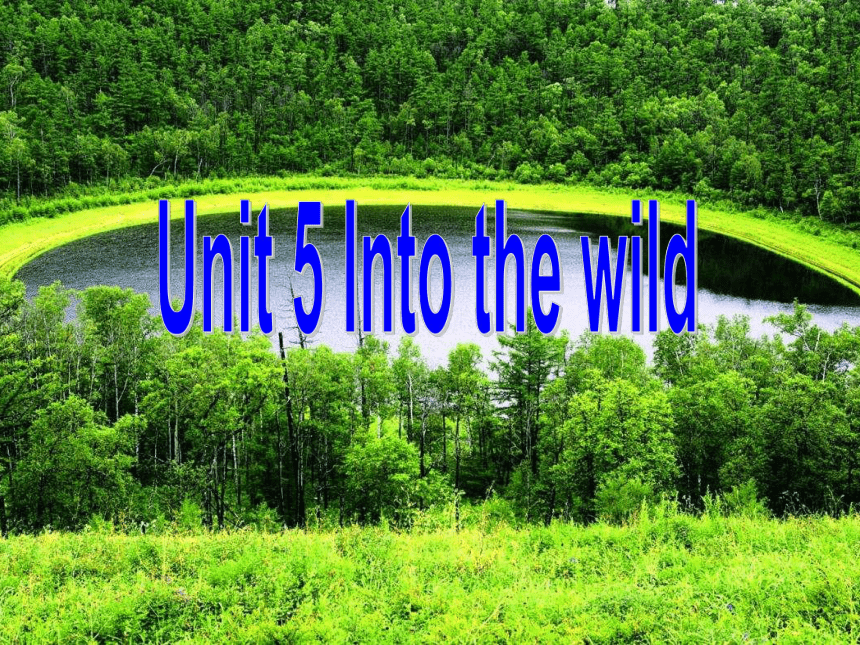
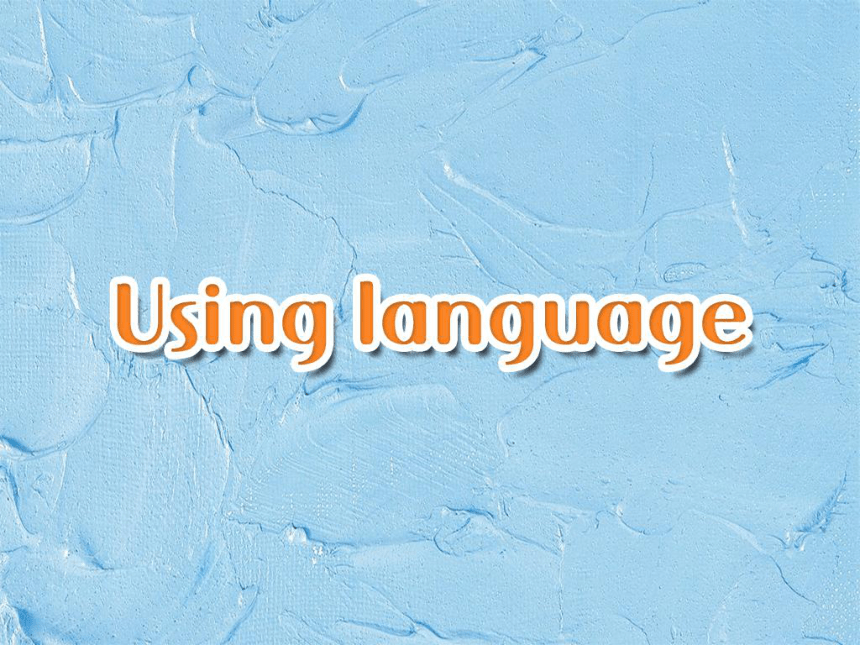
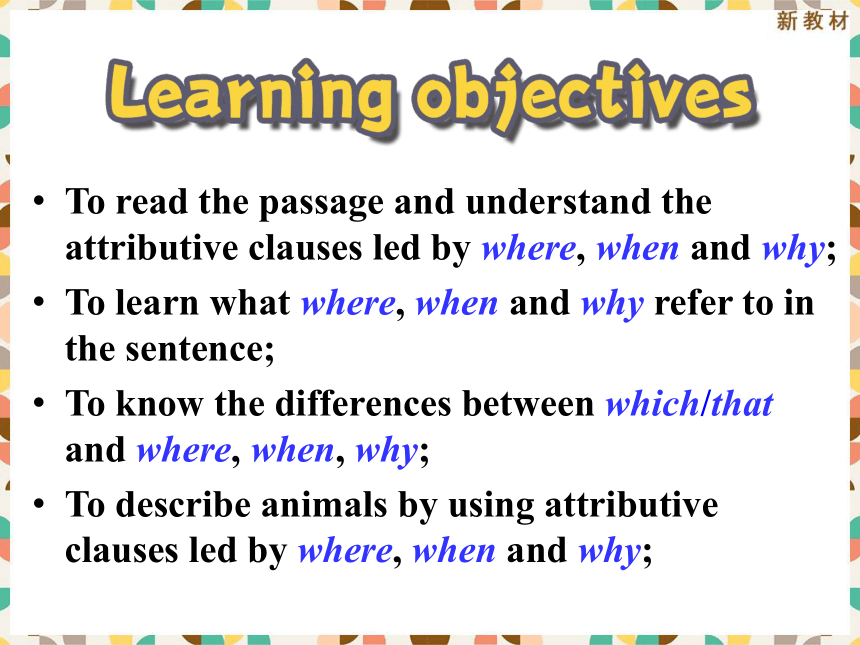
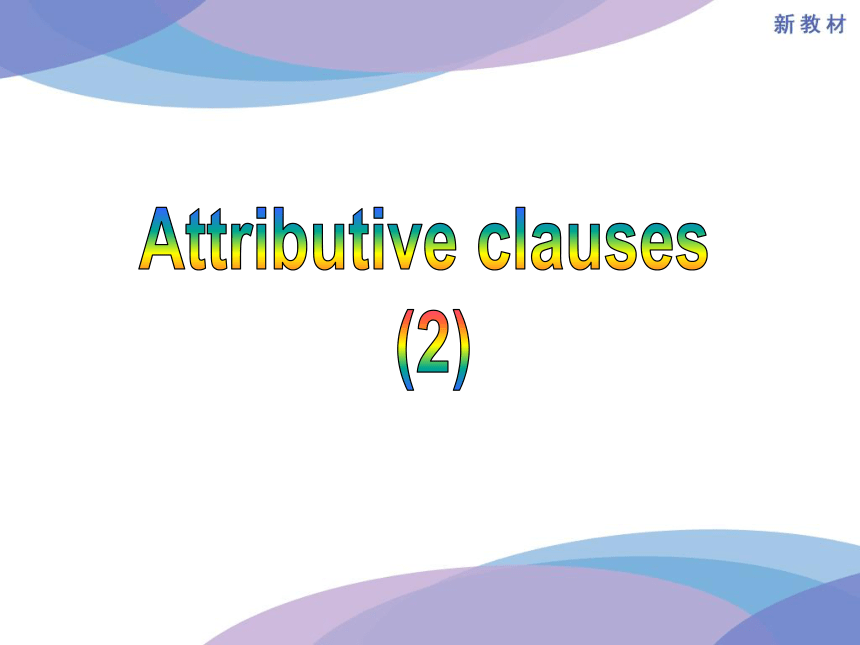
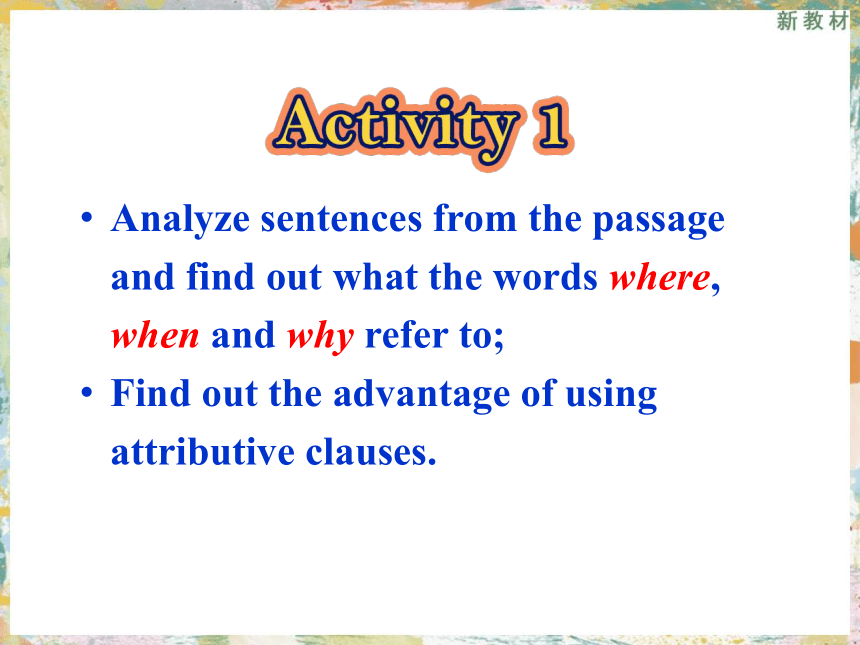
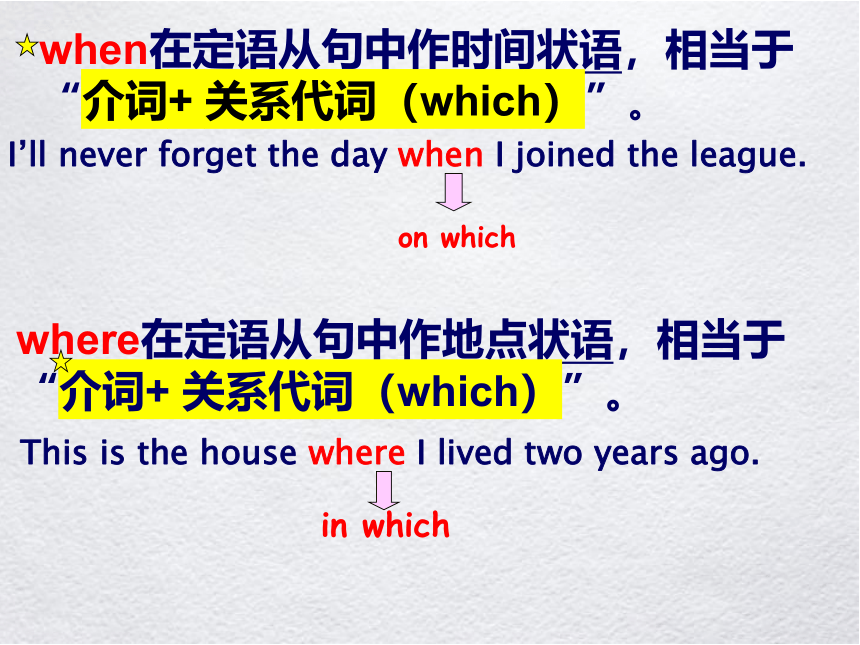
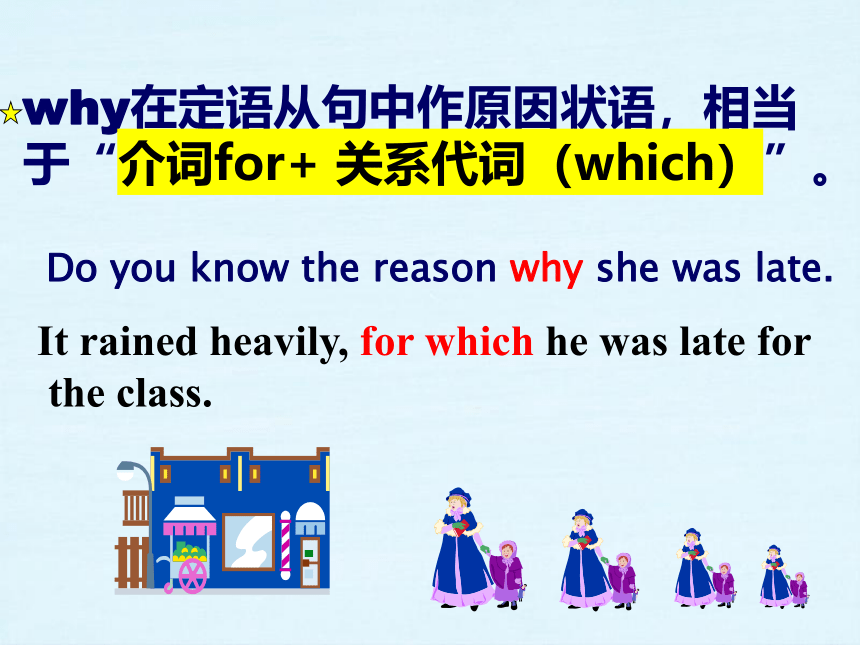
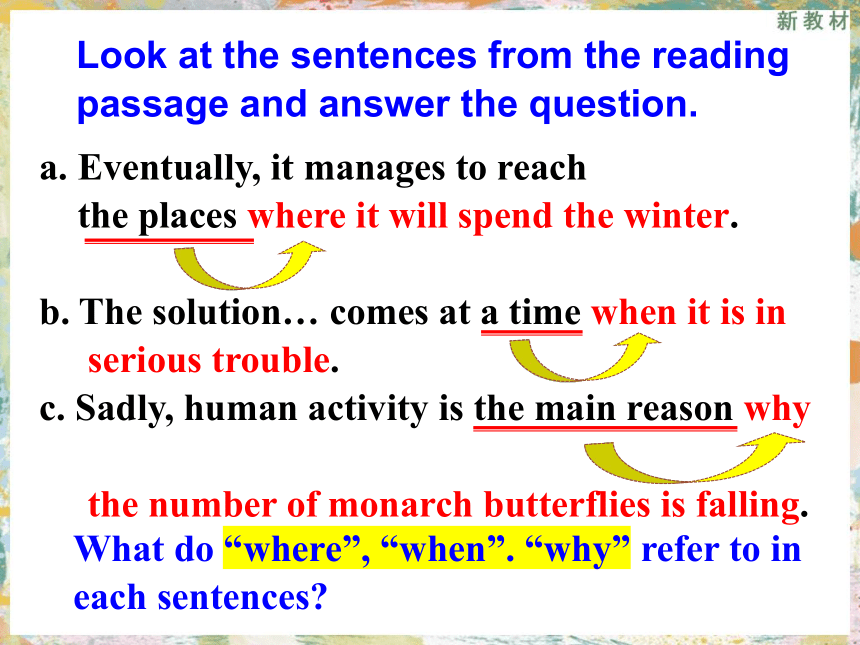
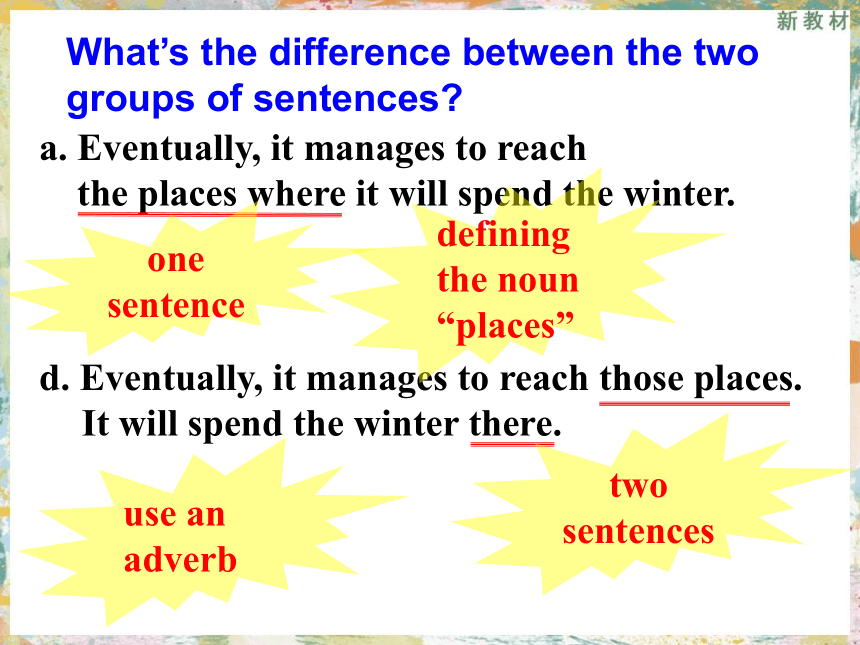
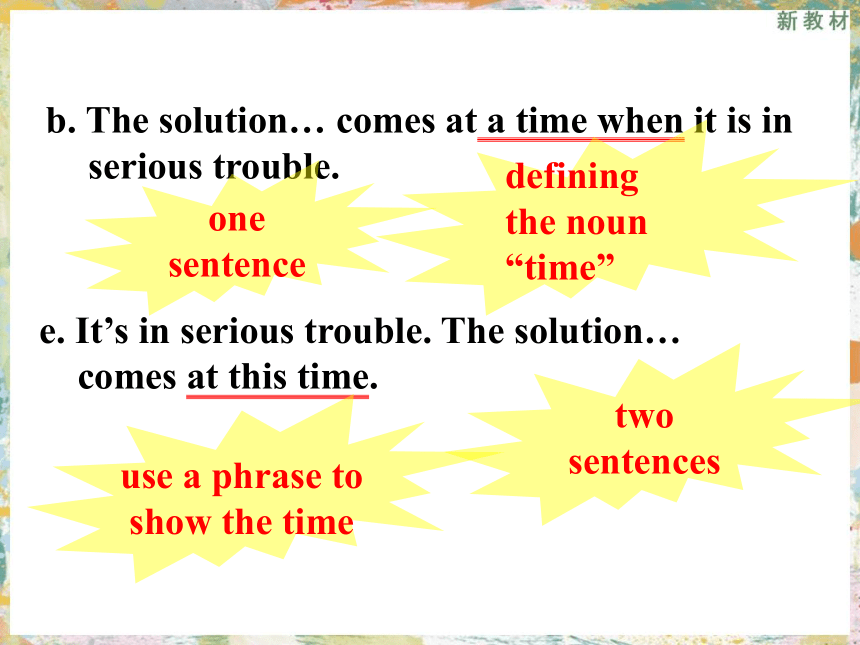
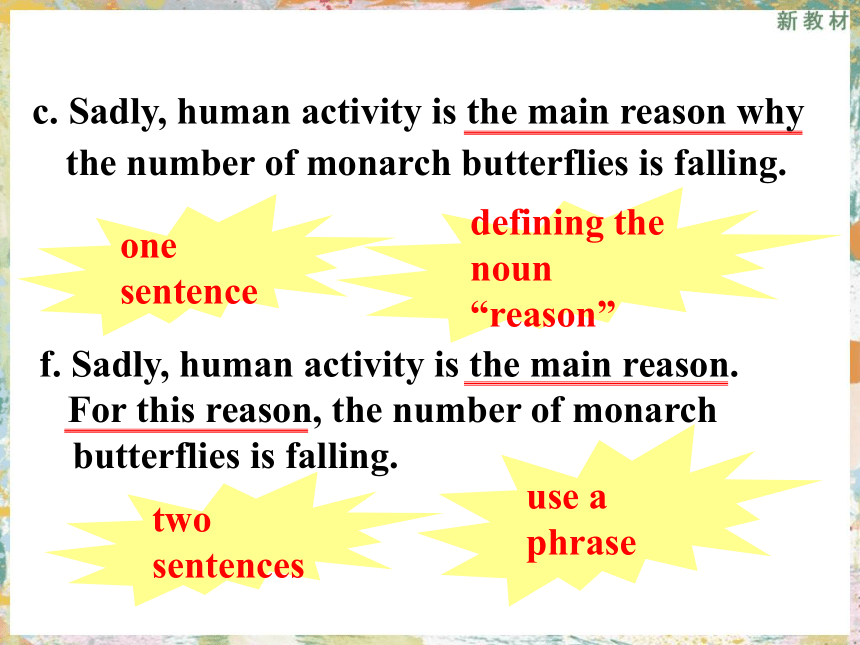
文档简介
(共46张PPT)
Unit 5
Unit 5 Into the wild
To read the passage and understand the attributive clauses led by where, when and why;
To learn what where, when and why refer to in the sentence;
To know the differences between which/that and where, when, why;
To describe animals by using attributive clauses led by where, when and why;
Attributive clauses
(2)
Analyze sentences from the passage and find out what the words where, when and why refer to;
Find out the advantage of using attributive clauses.
when在定语从句中作时间状语,相当于
“介词+ 关系代词(which)”。
I’ll never forget the day when I joined the league.
on which
where在定语从句中作地点状语,相当于
“介词+ 关系代词(which)”。
This is the house where I lived two years ago.
in which
why在定语从句中作原因状语,相当
于“介词for+ 关系代词(which)”。
Do you know the reason why she was late.
It rained heavily, for which he was late for
the class.
Look at the sentences from the reading passage and answer the question.
a. Eventually, it manages to reach
the places where it will spend the winter.
b. The solution… comes at a time when it is in serious trouble.
c. Sadly, human activity is the main reason why
the number of monarch butterflies is falling.
What do “where”, “when”. “why” refer to in each sentences
What’s the difference between the two groups of sentences
a. Eventually, it manages to reach
the places where it will spend the winter.
d. Eventually, it manages to reach those places. It will spend the winter there.
one sentence
two sentences
defining the noun “places”
use an adverb
b. The solution… comes at a time when it is in serious trouble.
e. It’s in serious trouble. The solution…
comes at this time.
one sentence
two sentences
defining the noun “time”
use a phrase to show the time
c. Sadly, human activity is the main reason why the number of monarch butterflies is falling.
f. Sadly, human activity is the main reason.
For this reason, the number of monarch butterflies is falling.
one sentence
two sentences
use a phrase
defining the noun “reason”
Why does the author choose to use sentences (a), (b), and (c) in the reading passage
thinking
Because there is a closer link and connection between the item and the clause defining it in the sentences (a), (b) and (c). It will also make the passage clearer, and create an emphatic effect on the location, time and reason being defined.
More practice for what the words where, when and why refer to;
Compare attributive clauses led by which/that with the ones led by where, when or why;
1. Look for more sentences with attributive clauses in the reading passage.
1) These two pieces of information – the time
of day and the point where the sun is in
the sky…
先行词
Where在从句中作地点状语
2) In many of the places where the butterfly can be found, people are destroying …
3) They cut down trees and use chemicals that kill the plants that monarch caterpillars eat.
4) If this works, there may come a time when the number of monarch butterflies may increases once again.
2. Read the passage and underline the words that where, when, and why refer to.
where
在定语从句中用作地点状语,其先行词须是表地点的名词。
如: This is the school where I studied a few
years ago.
关系副词在定语从句中的用法
why
在定语从句中用作原因状语,其先行词一般是reason(s)。
如: Do you know the reason why he is not
here
when
在定语从句中用作时间状语,其先行词须是表时间的名词。
如: Can you tell me the time when the film
will start
【拓展】
1) 当 situation, case, point (地点), occasion(场合) 等充当先行词,且在定语从句中作地点状语时,定语从句引导词用where;如:
You could get into a situation where you have to decide immediately.
你可能遇上一种情况,使你不得不立刻作出决定。
Three hours later, our bus reached the point where the road divides.
三小时后我们的车到达路的分岔处。
2) 当point (时刻),occasion(时刻)在定语从句中作时间状语时,定语从句引导词用when。如:
We had reached the point when there was no money left.
我们曾落到身无分文的地步。
Occasions are quite rare when I have the time to spend a day with my kids.
我能跟孩子们待一整天的时候很少。
a. Eventually, it manages to reach the places where it will spend the winter.
Eventually, it manages to reach the places
which is warm in winter.
adverbial
subject
Compare the following sentences and find out the different use of which/that and when.
b. The solution… comes at a time when it is in serious trouble.
The solution… comes at a time
which is recorded in the book.
adverbial
subject
c. Sadly, human activity is the main reason why the number of monarch butterflies is falling.
Sadly, human activity is the main reason which the scientist has found in his
research.
adverbial
object
When we use which/that to lead an attributive clause, which/that is used as subject or object in the clause.
If we use where, when or why to lead an attributive clause, where, when or why is used as an adverbial in the clause.
Conclusion
Complete sentences with the proper words which/that, where, when or why;
Use attributive clauses to describe an animal.
We have known the use of which/that, where, when and why. When we choose the proper word, we should first analyze the attributive clause’s sentence structure.
From: David Waters To: Kay Silverman
Subject: Back to nature
Hi Kay,
We’re having an amazing time here in South Africa. Our accommodation is perfect. It is in a location _______ we can watch animals wandering past on their way to the waterhole.
where
Complete the email with where, when or why.
Sunset is the time of day _______ we sit on the balcony and count how many giraffes or antelopes we can see.
I guess this is the reason _______ this place is so popular. Next week, we are going to fly up to Zambia. That’s one of the countries _______ you can visit the famous Victoria Falls.
See you soon.
David
when
why
where
Animal idioms
Understand and use the animal idioms.
1. as busy as a(n) _______
2. kill two _______ with one stone
3. When the cat’s away, the _______ will play.
bee
birds
mice
Look at the pictures and complete the idioms with animal names.
4. hold your _______
5. It’s raining _______ and ________.
horses
cats
dogs
English idioms are a way of adding colour to the language. For example, instead of saying “It’s raining heavily”, you could say “_______________________”. Another reason to use idioms is that they are concise. For example, to describe someone who is always working or busy doing something, we can say they are __________________.
It’s raining cats and dogs
as busy as a bee
Complete the paragraph with the animal idioms above.
If they’re rushing into something and should wait and be patient, you could say “_________________”. Learning idioms can be fun, especially when we compare them to Chinese equivalents. Take, for example, “__________________________________ ” (people do what they want and have fun when someone in authority is absent) and “_________________________” (solve two problems with one action) – are there corresponding idioms in Chinese
hold your horses
When the cat’s away, the mice will play
kill two birds with one stone
Find more animal idioms.
Love me, love my dog. 爱屋及乌。
like a cat on hot bricks 像热锅上的蚂蚁
He is a lucky dog. 他是个幸运儿。
dark horse 黑马
Never offer to teach fish to swim.
不要班门弄斧。
A bird in the hand is worth two in the bush.
双鸟在林不如一鸟在手。
Fine feathers make fine birds.
人要衣装,马要鞍。
Cats hide their claws.
知人知面不知心。
Don't count your chickens before they're hatched.
鸡蛋未孵出,先别数小鸡。
A crow is never the whiter for washing herself often.
江山易改,本性难移。
Every dog has his day. 人人皆有得意时。
Let sleeping dogs lie. 勿惹是生非。
The frog in the well knows nothing of the great ocean.
井底之蛙,不知大海。
The fox preys farthest from his hole.
兔子不吃窝边草。
Create situations to use the animal idioms;
Use attributive clauses to help you express your ideas.
Choose an idiom and describe a situation with it.
A: She’s as busy as a bee.
B: What makes you say that
…
You can tell a story and have some animal idioms in it;
Pay attention to the tense you will use in your story;
You can use attributive clauses to modify somebody or something in your story. That will make your story more attractive.
Lily is as busy as a bee. She is a person who never has free time. When she comes to the place where she works, she will not stop until she can finish the work. There is no time when she will keep still and has nothing to do.
Write a passage about the experience between you and the animals, and use some attributive clauses in your passage.
Unit 5
Unit 5 Into the wild
To read the passage and understand the attributive clauses led by where, when and why;
To learn what where, when and why refer to in the sentence;
To know the differences between which/that and where, when, why;
To describe animals by using attributive clauses led by where, when and why;
Attributive clauses
(2)
Analyze sentences from the passage and find out what the words where, when and why refer to;
Find out the advantage of using attributive clauses.
when在定语从句中作时间状语,相当于
“介词+ 关系代词(which)”。
I’ll never forget the day when I joined the league.
on which
where在定语从句中作地点状语,相当于
“介词+ 关系代词(which)”。
This is the house where I lived two years ago.
in which
why在定语从句中作原因状语,相当
于“介词for+ 关系代词(which)”。
Do you know the reason why she was late.
It rained heavily, for which he was late for
the class.
Look at the sentences from the reading passage and answer the question.
a. Eventually, it manages to reach
the places where it will spend the winter.
b. The solution… comes at a time when it is in serious trouble.
c. Sadly, human activity is the main reason why
the number of monarch butterflies is falling.
What do “where”, “when”. “why” refer to in each sentences
What’s the difference between the two groups of sentences
a. Eventually, it manages to reach
the places where it will spend the winter.
d. Eventually, it manages to reach those places. It will spend the winter there.
one sentence
two sentences
defining the noun “places”
use an adverb
b. The solution… comes at a time when it is in serious trouble.
e. It’s in serious trouble. The solution…
comes at this time.
one sentence
two sentences
defining the noun “time”
use a phrase to show the time
c. Sadly, human activity is the main reason why the number of monarch butterflies is falling.
f. Sadly, human activity is the main reason.
For this reason, the number of monarch butterflies is falling.
one sentence
two sentences
use a phrase
defining the noun “reason”
Why does the author choose to use sentences (a), (b), and (c) in the reading passage
thinking
Because there is a closer link and connection between the item and the clause defining it in the sentences (a), (b) and (c). It will also make the passage clearer, and create an emphatic effect on the location, time and reason being defined.
More practice for what the words where, when and why refer to;
Compare attributive clauses led by which/that with the ones led by where, when or why;
1. Look for more sentences with attributive clauses in the reading passage.
1) These two pieces of information – the time
of day and the point where the sun is in
the sky…
先行词
Where在从句中作地点状语
2) In many of the places where the butterfly can be found, people are destroying …
3) They cut down trees and use chemicals that kill the plants that monarch caterpillars eat.
4) If this works, there may come a time when the number of monarch butterflies may increases once again.
2. Read the passage and underline the words that where, when, and why refer to.
where
在定语从句中用作地点状语,其先行词须是表地点的名词。
如: This is the school where I studied a few
years ago.
关系副词在定语从句中的用法
why
在定语从句中用作原因状语,其先行词一般是reason(s)。
如: Do you know the reason why he is not
here
when
在定语从句中用作时间状语,其先行词须是表时间的名词。
如: Can you tell me the time when the film
will start
【拓展】
1) 当 situation, case, point (地点), occasion(场合) 等充当先行词,且在定语从句中作地点状语时,定语从句引导词用where;如:
You could get into a situation where you have to decide immediately.
你可能遇上一种情况,使你不得不立刻作出决定。
Three hours later, our bus reached the point where the road divides.
三小时后我们的车到达路的分岔处。
2) 当point (时刻),occasion(时刻)在定语从句中作时间状语时,定语从句引导词用when。如:
We had reached the point when there was no money left.
我们曾落到身无分文的地步。
Occasions are quite rare when I have the time to spend a day with my kids.
我能跟孩子们待一整天的时候很少。
a. Eventually, it manages to reach the places where it will spend the winter.
Eventually, it manages to reach the places
which is warm in winter.
adverbial
subject
Compare the following sentences and find out the different use of which/that and when.
b. The solution… comes at a time when it is in serious trouble.
The solution… comes at a time
which is recorded in the book.
adverbial
subject
c. Sadly, human activity is the main reason why the number of monarch butterflies is falling.
Sadly, human activity is the main reason which the scientist has found in his
research.
adverbial
object
When we use which/that to lead an attributive clause, which/that is used as subject or object in the clause.
If we use where, when or why to lead an attributive clause, where, when or why is used as an adverbial in the clause.
Conclusion
Complete sentences with the proper words which/that, where, when or why;
Use attributive clauses to describe an animal.
We have known the use of which/that, where, when and why. When we choose the proper word, we should first analyze the attributive clause’s sentence structure.
From: David Waters To: Kay Silverman
Subject: Back to nature
Hi Kay,
We’re having an amazing time here in South Africa. Our accommodation is perfect. It is in a location _______ we can watch animals wandering past on their way to the waterhole.
where
Complete the email with where, when or why.
Sunset is the time of day _______ we sit on the balcony and count how many giraffes or antelopes we can see.
I guess this is the reason _______ this place is so popular. Next week, we are going to fly up to Zambia. That’s one of the countries _______ you can visit the famous Victoria Falls.
See you soon.
David
when
why
where
Animal idioms
Understand and use the animal idioms.
1. as busy as a(n) _______
2. kill two _______ with one stone
3. When the cat’s away, the _______ will play.
bee
birds
mice
Look at the pictures and complete the idioms with animal names.
4. hold your _______
5. It’s raining _______ and ________.
horses
cats
dogs
English idioms are a way of adding colour to the language. For example, instead of saying “It’s raining heavily”, you could say “_______________________”. Another reason to use idioms is that they are concise. For example, to describe someone who is always working or busy doing something, we can say they are __________________.
It’s raining cats and dogs
as busy as a bee
Complete the paragraph with the animal idioms above.
If they’re rushing into something and should wait and be patient, you could say “_________________”. Learning idioms can be fun, especially when we compare them to Chinese equivalents. Take, for example, “__________________________________ ” (people do what they want and have fun when someone in authority is absent) and “_________________________” (solve two problems with one action) – are there corresponding idioms in Chinese
hold your horses
When the cat’s away, the mice will play
kill two birds with one stone
Find more animal idioms.
Love me, love my dog. 爱屋及乌。
like a cat on hot bricks 像热锅上的蚂蚁
He is a lucky dog. 他是个幸运儿。
dark horse 黑马
Never offer to teach fish to swim.
不要班门弄斧。
A bird in the hand is worth two in the bush.
双鸟在林不如一鸟在手。
Fine feathers make fine birds.
人要衣装,马要鞍。
Cats hide their claws.
知人知面不知心。
Don't count your chickens before they're hatched.
鸡蛋未孵出,先别数小鸡。
A crow is never the whiter for washing herself often.
江山易改,本性难移。
Every dog has his day. 人人皆有得意时。
Let sleeping dogs lie. 勿惹是生非。
The frog in the well knows nothing of the great ocean.
井底之蛙,不知大海。
The fox preys farthest from his hole.
兔子不吃窝边草。
Create situations to use the animal idioms;
Use attributive clauses to help you express your ideas.
Choose an idiom and describe a situation with it.
A: She’s as busy as a bee.
B: What makes you say that
…
You can tell a story and have some animal idioms in it;
Pay attention to the tense you will use in your story;
You can use attributive clauses to modify somebody or something in your story. That will make your story more attractive.
Lily is as busy as a bee. She is a person who never has free time. When she comes to the place where she works, she will not stop until she can finish the work. There is no time when she will keep still and has nothing to do.
Write a passage about the experience between you and the animals, and use some attributive clauses in your passage.
